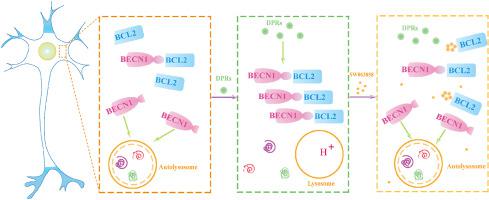当前位置:
X-MOL 学术
›
Acta Pharm. Sin. B
›
论文详情
Our official English website, www.x-mol.net, welcomes your feedback! (Note: you will need to create a separate account there.)
ALS-linked C9orf72 dipeptide repeats inhibit starvation-induced autophagy through modulating BCL2–BECN1 interaction
Acta Pharmaceutica Sinica B ( IF 14.5 ) Pub Date : 2024-02-07 , DOI: 10.1016/j.apsb.2024.02.004 Shiqiang Xu , Qilian Ma , Junwen Shen , Ningning Li , Shan Sun , Nana Wang , Yang Chen , Chunsheng Dong , Kin Yip Tam , Jochen H.M. Prehn , Hongfeng Wang , Zheng Ying
Acta Pharmaceutica Sinica B ( IF 14.5 ) Pub Date : 2024-02-07 , DOI: 10.1016/j.apsb.2024.02.004 Shiqiang Xu , Qilian Ma , Junwen Shen , Ningning Li , Shan Sun , Nana Wang , Yang Chen , Chunsheng Dong , Kin Yip Tam , Jochen H.M. Prehn , Hongfeng Wang , Zheng Ying

|
Growing evidences indicate that dysfunction of autophagy contributes to the disease pathogenesis of amyotrophic lateral sclerosis (ALS) and frontotemporal dementia (FTD), two neurodegenerative disorders. The GGGGCC·GGCCCC repeat RNA expansion in chromosome 9 open reading frame 72 () is the most genetic cause of both ALS and FTD. According to the previous studies, GGGGCC·GGCCCC repeat undergoes the unconventional repeat-associated non-ATG translation, which produces dipeptide repeat (DPR) proteins. Although there is a growing understanding that DPRs have a strong ability to harm neurons and induce -linked ALS/FTD, whether these DPRs can affect autophagy remains unclear. In the present study, we find that poly-GR and poly-PR, two arginine-containing DPRs which display the most cytotoxic properties according to the previous studies, strongly inhibit starvation-induced autophagy. Moreover, our data indicate that arginine-rich DPRs enhance the interaction between BCL2 and BECN1/Beclin 1 by inhibiting BCL2 phosphorylation, therefore they can impair autophagic clearance of neurodegenerative disease-associated protein aggregates under starvation condition in cells. Importantly, our study not only highlights the role of DPR in autophagy dysfunction, but also provides novel insight that pharmacological intervention of autophagy using SW063058, a small molecule compound that can disrupt the interaction between BECN1 and BCL2, may reduce DPR-induced neurotoxicity.
中文翻译:

ALS 连接的 C9orf72 二肽重复序列通过调节 BCL2-BECN1 相互作用抑制饥饿诱导的自噬
越来越多的证据表明,自噬功能障碍导致肌萎缩侧索硬化症(ALS)和额颞叶痴呆(FTD)这两种神经退行性疾病的发病机制。 9 号染色体开放阅读框 72 () 中的 GGGGCC·GGCCCC 重复 RNA 扩增是 ALS 和 FTD 的最主要遗传原因。根据以往的研究,GGGGCC·GGCCCC重复序列经历非常规的重复相关非ATG翻译,产生二肽重复序列(DPR)蛋白。尽管人们越来越认识到 DPR 具有很强的伤害神经元并诱导相关 ALS/FTD 的能力,但这些 DPR 是否会影响自噬仍不清楚。在本研究中,我们发现poly-GR和poly-PR这两种含有精氨酸的DPR根据之前的研究显示出最具细胞毒性的特性,可以强烈抑制饥饿诱导的自噬。此外,我们的数据表明,富含精氨酸的 DPR 通过抑制 BCL2 磷酸化来增强 BCL2 和 BECN1/Beclin 1 之间的相互作用,因此它们可以损害细胞饥饿条件下神经退行性疾病相关蛋白聚集体的自噬清除。重要的是,我们的研究不仅强调了 DPR 在自噬功能障碍中的作用,而且还提供了新的见解,即使用 SW063058(一种可以破坏 BECN1 和 BCL2 之间相互作用的小分子化合物)对自噬进行药物干预,可能会减少 DPR 诱导的神经毒性。
更新日期:2024-02-07
中文翻译:

ALS 连接的 C9orf72 二肽重复序列通过调节 BCL2-BECN1 相互作用抑制饥饿诱导的自噬
越来越多的证据表明,自噬功能障碍导致肌萎缩侧索硬化症(ALS)和额颞叶痴呆(FTD)这两种神经退行性疾病的发病机制。 9 号染色体开放阅读框 72 () 中的 GGGGCC·GGCCCC 重复 RNA 扩增是 ALS 和 FTD 的最主要遗传原因。根据以往的研究,GGGGCC·GGCCCC重复序列经历非常规的重复相关非ATG翻译,产生二肽重复序列(DPR)蛋白。尽管人们越来越认识到 DPR 具有很强的伤害神经元并诱导相关 ALS/FTD 的能力,但这些 DPR 是否会影响自噬仍不清楚。在本研究中,我们发现poly-GR和poly-PR这两种含有精氨酸的DPR根据之前的研究显示出最具细胞毒性的特性,可以强烈抑制饥饿诱导的自噬。此外,我们的数据表明,富含精氨酸的 DPR 通过抑制 BCL2 磷酸化来增强 BCL2 和 BECN1/Beclin 1 之间的相互作用,因此它们可以损害细胞饥饿条件下神经退行性疾病相关蛋白聚集体的自噬清除。重要的是,我们的研究不仅强调了 DPR 在自噬功能障碍中的作用,而且还提供了新的见解,即使用 SW063058(一种可以破坏 BECN1 和 BCL2 之间相互作用的小分子化合物)对自噬进行药物干预,可能会减少 DPR 诱导的神经毒性。



























 京公网安备 11010802027423号
京公网安备 11010802027423号